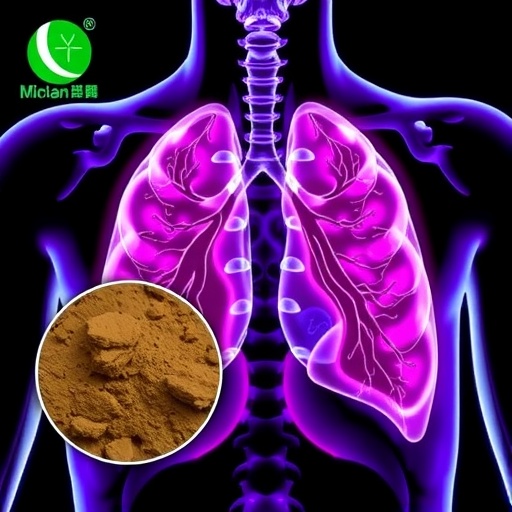In a groundbreaking advancement in cancer research, a team of scientists recently unveiled compelling evidence on the antimetastatic potential of chamuangone-enriched extract against breast cancer lung metastasis. The study not only elucidates the biochemical pathways involved in metastatic progression but also highlights the therapeutic promise of natural compounds in combating one of the most formidable challenges in oncology – the spread of cancer to distant organs.
Metastasis remains the principal cause of mortality in breast cancer patients, with the lungs representing a common and devastating site for secondary tumors. Despite significant strides in primary tumor treatment, effective interventions addressing metastatic colonization and growth are urgently needed. The research spearheaded by Rahman, Khan, Ni, and colleagues, as featured in the latest issue of Medical Oncology, ventures into this uncharted territory with a novel botanical extract: chamuangone, derived from the plant Garcinia cowa.
The investigation adopts an integrative in vitro and in vivo approach to delineate the extract’s mechanisms and efficacy. In the laboratory setting, cancerous breast cells treated with chamuangone-enriched extract exhibited a marked reduction in migratory and invasive behaviors. These findings are crucial because the ability of cancer cells to detach, migrate, and invade distant tissues underpins the metastatic cascade. By impairing these cellular functions, chamuangone emerges as a potentially powerful antimetastatic agent.
Delving deeper into molecular mechanisms, the team reports that key signaling pathways involved in metastasis, such as the PI3K/Akt and MAPK pathways, were significantly inhibited upon treatment. These pathways are known to regulate cell survival, proliferation, and motility, making their disruption a strategic target in halting metastatic progression. The researchers demonstrated that chamuangone effectively downregulates these signaling molecules, thereby curbing the cellular machinery essential for metastasis.
Complementing cell culture assays, animal models provided rigorous in vivo validation of the extract’s antimetastatic activity. Mice injected with metastatic breast cancer cells and subsequently treated with chamuangone-enriched extract displayed a significant reduction in lung tumor nodules compared to controls. This phenotypic outcome not only substantiates the in vitro findings but also emphasizes the extract’s therapeutic potential in a living organism, where complex systemic interactions occur.
Furthermore, histological analyses of lung tissues revealed diminished angiogenesis in treated subjects. Since the formation of new blood vessels is a prerequisite for metastatic tumor survival and expansion, the anti-angiogenic effect of chamuangone adds another layer to its multifaceted antimetastatic profile. This dual action—suppressing both cell invasion and tumor vascularization—may underlie the compound’s potent efficacy in halting metastatic tumor growth.
Another remarkable aspect of this study is the extract’s ability to modulate the tumor microenvironment, a critical factor in metastasis. Chamuangone was found to reduce inflammatory cytokines and matrix metalloproteinases (MMPs), which facilitate extracellular matrix degradation and enable cancer cell dissemination. By restoring homeostasis within the tumor microenvironment, the extract further impedes metastatic progression, highlighting its comprehensive mode of action.
Importantly, the researchers observed minimal toxicity in normal cells and animal subjects at therapeutic doses, indicating a favorable safety profile. This distinction is vital when considering the translational potential of botanical compounds, as many chemotherapeutics suffer from severe side effects that limit their clinical application.
The source of chamuangone, Garcinia cowa, and its traditional use in folk medicine bring a fascinating ethnopharmacological dimension to the research. Historically acclaimed for various medicinal properties, this plant’s bioactive constituents are now being scientifically validated for cutting-edge cancer therapeutics. This convergence of traditional knowledge and modern science underscores the untapped potential of natural products in drug discovery.
While this study paves a promising path forward, the authors cautiously note that further clinical evaluations are necessary to confirm efficacy and safety in humans. Pharmacokinetics, optimal dosing regimens, and potential drug interactions remain to be elucidated before chamuangone-enriched preparations can be integrated into mainstream oncology practice.
Moreover, the findings open new avenues for combinatorial therapies. Pairing chamuangone with existing chemotherapeutic agents or immune checkpoint inhibitors could potentiate their effectiveness and mitigate resistance mechanisms often encountered in metastatic cancers. Future research geared toward such synergistic strategies could revolutionize treatment paradigms.
From a technological standpoint, high-performance liquid chromatography (HPLC) and mass spectrometry techniques were employed to precisely characterize the chemical profile of the extract, ensuring reproducibility and standardization—critical parameters for advancing botanical compounds toward clinical use.
The study also emphasized the utility of advanced imaging modalities to monitor metastatic burden and response to treatment in real-time. Techniques such as bioluminescence imaging in animal models afforded dynamic insights into tumor progression and regression, enhancing the robustness of in vivo data.
Altogether, the investigations into chamuangone-enriched extract represent a milestone in metastatic breast cancer research, embodying a sophisticated blend of molecular biology, pharmacology, and natural product chemistry. As metastasis continues to pose a formidable barrier to cancer cure, the emergence of novel, less toxic, and multi-targeted agents provides a beacon of hope.
This research not only challenges the current therapeutic landscape but also exemplifies the promise of integrative oncology—where nature-derived compounds, scientific rigor, and clinical acumen converge to confront one of humanity’s deadliest diseases. Continued exploration along these lines may eventually yield effective, patient-friendly treatments capable of halting metastatic breast cancer progression and improving survival outcomes worldwide.
Subject of Research: The antimetastatic effects of chamuangone-enriched extract on breast cancer lung metastasis.
Article Title: Antimetastatic effects of chamuangone-enriched extract in breast cancer lung metastasis: in vitro and in vivo evidence.
Article References:
Rahman, A.U., Khan, N.U., Ni, J. et al. Antimetastatic effects of chamuangone-enriched extract in breast cancer lung metastasis: in vitro and in vivo evidence. Med Oncol 42, 517 (2025). https://doi.org/10.1007/s12032-025-03076-7
Image Credits: AI Generated




